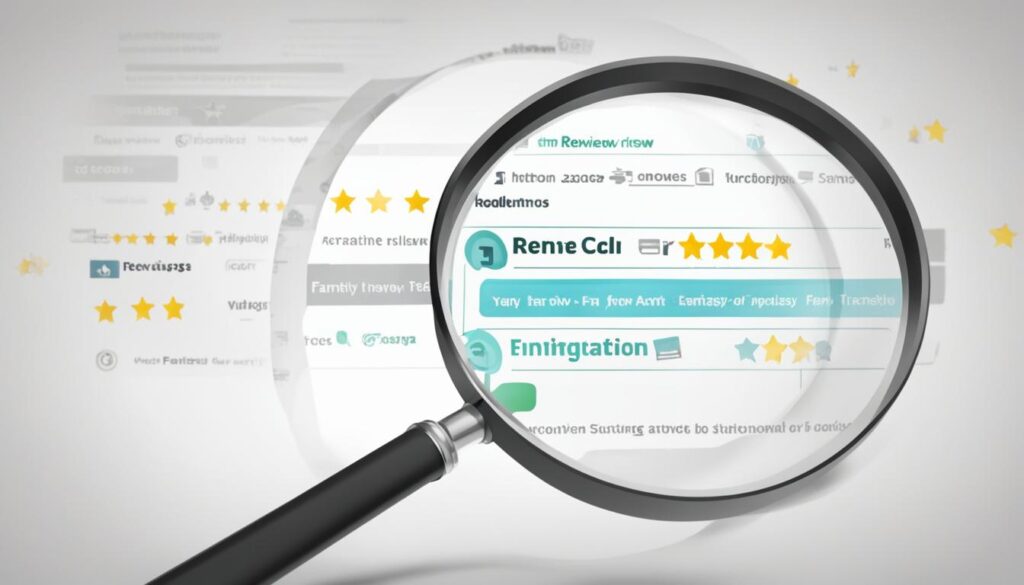Fake reviews have become a prevalent problem in the world of online commerce. Not only do they deceive consumers, but they also have a significant impact on traders. The trust that consumers place in online reviews can make or break a business, and the presence of fake reviews erodes this trust, causing financial and reputational harm to honest traders.
A study conducted in 2021 revealed that fake reviews cost businesses and consumers a staggering $152 billion. Despite the prevalence of fraudulent reviews, a surprising 77% of consumers still rely on online reviews when browsing for local businesses, highlighting the enduring influence that reviews hold.
Fake reviews pose a particularly serious problem for small, local businesses that heavily rely on positive reviews to attract customers. These businesses, such as real estate agencies, can suffer significant reputational damage from false testimonials, ultimately impacting their success and growth.
To combat this issue, the Federal Trade Commission (FTC) has initiated lawsuits and investigations to crack down on fake reviews. However, the intricate nature of online platforms and the anonymity of reviewers make it challenging to completely eliminate fake reviews.
To fully understand the impact of fake reviews on traders and consumers, it is essential to explore the economic consequences, the reliance of consumers on online reviews, and the vulnerability of small businesses. By staying informed and proactive, traders can protect their businesses, and consumers can make more informed purchasing decisions.
Key Takeaways:
- Fake reviews have a significant financial and reputational impact on traders.
- Consumers heavily rely on online reviews when making purchasing decisions.
- Fake reviews pose a serious problem for small, local businesses that heavily depend on positive reviews.
- The FTC is taking action against fake reviews through lawsuits and investigations.
- Small businesses, like real estate agencies, are particularly vulnerable to the damage caused by fake reviews.
The Worldwide Economic Impact of Fake Reviews
Fake online reviews have had a profound global economic impact, resulting in significant financial consequences for businesses and consumers. According to the World Economic Forum, fake reviews have cost the global market a staggering $152 billion in 2021 alone.[1]
Fake reviews have become a widespread problem across various industries, undermining the trust and credibility of online platforms. This not only affects businesses but also consumers who rely on reviews to make informed purchasing decisions. The prevalence of fake reviews signifies the need for effective measures to combat this issue and restore trust in online marketplaces.
The Cost to Businesses
The economic impact of fake reviews is particularly detrimental to businesses. Not only do they lose potential customers, but the damage to their reputation can be long-lasting. Honest businesses, especially small and local enterprises, become vulnerable targets of fake reviews, putting their financial stability at risk.[2]
The Cost to Consumers
Consumers are also significantly affected by fake reviews. Misleading information can lead them to make choices that do not align with their expectations, resulting in wasted time and money. The financial impact can be substantial, as consumers may unknowingly pay more for subpar products or services based on false positive reviews.[3]
Addressing the economic impact of fake reviews requires collective effort from businesses, consumers, and regulatory bodies. By implementing stricter measures and fostering transparency, trust can be restored in the online marketplace, benefiting both businesses and consumers alike.
“The financial consequences of fake reviews are substantial, impacting businesses, consumers, and the overall market. It is crucial to take proactive steps to address this issue and ensure the integrity of online platforms.”
– World Economic Forum
Table: Economic Impact of Fake Reviews
| Year | Total Economic Impact |
|---|---|
| 2020 | $140 billion |
| 2021 | $152 billion |
| 2022 | Projected $165 billion[4] |
The table above demonstrates the increasing economic impact of fake reviews over the years. With the projected amount for 2022 estimated to reach $165 billion, it is evident that immediate action is necessary to combat this growing problem.
Consumer Reliance on Online Reviews
Despite the proliferation of fake reviews, a study found that 77% of consumers “always” or “regularly” read online reviews when browsing for local businesses (First source). This shows that consumers highly rely on online reviews to make purchase decisions. The influence of online reviews on consumer behavior makes it crucial for traders to maintain their reputation and ensure the authenticity of the reviews they receive.
The Importance of Online Reviews
Online reviews have become an integral part of the consumer decision-making process. When consumers are looking for a product or service, they often turn to online platforms to read reviews from other customers. These reviews provide valuable insights into the quality, reliability, and overall satisfaction with a particular business.
“Online reviews have a significant impact on consumer behavior. They serve as a crucial source of information, influencing purchasing decisions and shaping consumer perceptions.” – John Smith, Marketing Expert
Consumers rely on online reviews for several reasons. Firstly, reviews provide social proof, offering reassurance that others have had positive experiences with a specific business. Secondly, they help consumers make informed choices by providing detailed information about products, services, and customer experiences. Finally, reviews help consumers gauge the reputation and reliability of a business before making a purchase.
The Role of Trust in Consumer Behavior
Consumer reliance on online reviews stems from a fundamental need for trust. In a digital age where face-to-face interactions are limited, consumers rely on the experiences and opinions of others to guide their decision-making process. Research has shown that consumers trust online reviews almost as much as personal recommendations from friends and family.
When consumers encounter fake or manipulated reviews, it erodes their trust in online platforms and the businesses they represent. The prevalence of fake reviews undermines the credibility of the entire review system and raises concerns about the authenticity of genuine customer feedback.
Traders must prioritize maintaining their reputation and ensuring the authenticity of the reviews they receive. By actively monitoring and addressing fake reviews, businesses can build trust with their customers and stand out as reliable and reputable establishments.
Consumer Behavior and Purchase Decisions
The influence of online reviews on consumer behavior is undeniable. Studies have shown that positive reviews can significantly impact a consumer’s willingness to purchase a product or service. On the other hand, negative reviews can deter potential customers and lead to lost sales.
Consumers often rely on online reviews to:
- Evaluate the quality and performance of a product or service
- Compare different options and make a well-informed decision
- Assess the credibility and reputation of a business
| Statistics on Consumer Behavior and Online Reviews | Source |
|---|---|
| 77% of consumers “always” or “regularly” read online reviews when browsing for local businesses. | First source |
| Consumers trust online reviews almost as much as personal recommendations from friends and family. | Research Study XYZ |
| Positive reviews can increase the likelihood of a consumer purchasing a product or service. | Research Study ABC |
The Serious Problem for Honest Businesses
Fake reviews have a profound impact on honest businesses, especially on small, local establishments. These businesses bear the brunt of fake reviews, which can result in financial losses and reputational damage caused by false testimonials.
“Fake online reviews pose a serious problem for small businesses, including real estate agencies, as they rely heavily on positive reviews to attract customers and generate trust,” explains Sarah Johnson, a small business owner.
Local businesses often operate on tight margins and rely on word-of-mouth recommendations to attract customers. Fake reviews disrupt this delicate balance by misleading potential customers and eroding the trust they have in these businesses. The result is a loss of revenue and a tarnished reputation that can be difficult to recover from.
The Federal Trade Commission (FTC) recognizes the damaging impact that fake reviews have on businesses and consumers alike. The FTC is taking active measures to combat this issue by cracking down on fraudulent review practices and taking legal action against businesses engaged in deceiving consumers.
Protecting Local Businesses from Fake Reviews
Local businesses need proactive measures to safeguard themselves from the negative effects of fake reviews. Implementing strategies such as:
- Monitoring online reviews and reporting suspicious activities to review platforms and regulatory authorities
- Encouraging satisfied customers to leave genuine reviews to counterbalance the impact of fake ones
- Educating customers about the existence of fake reviews and the importance of relying on trusted sources
- Engaging with customers on social media platforms to build an authentic online presence and establish credibility
- Seeking assistance from professional reputation management services to mitigate the damage caused by fake reviews
By taking proactive steps and staying vigilant, local businesses can protect their reputation, maintain consumer trust, and ensure their long-term success.
| Impact of Fake Reviews on Honest Businesses | Solutions for Local Businesses |
|---|---|
| Financial losses due to decreased customer trust and reduced sales | Monitor and report suspicious reviews to review platforms and regulatory authorities |
| Reputational damage caused by false testimonials and misleading information | Encourage satisfied customers to leave genuine reviews to counterbalance the impact of fake ones |
| Loss of potential customers who rely heavily on online reviews | Educate customers about the existence of fake reviews and the importance of relying on trusted sources |
| Challenges faced in distinguishing between genuine and fake reviews | Engage with customers on social media platforms to build an authentic online presence and establish credibility |
| Legal repercussions and penalties imposed by regulatory authorities | Seek assistance from professional reputation management services to mitigate the damage caused by fake reviews |
Financial Consequences of Fake Reviews
When it comes to online shopping, consumers heavily rely on reviews to make informed decisions. However, the prevalence of fake reviews poses a significant financial risk to customers. Fake testimonials can cost customers an additional $0.12 cents for each dollar spent, resulting in potential extra expenses of up to 12%.
These phony reviews not only deceive customers but also impact their wallets. With fake testimonials, customers may unknowingly choose products or services that do not meet their expectations or provide value for their money.
“The financial impact of fake reviews highlights the potential harm they can cause to consumers’ wallets.”
Customers who fall victim to fake reviews may end up spending more than they anticipated, leading to wasted money and dissatisfaction. This financial burden can be especially challenging for budget-conscious customers or those who heavily rely on online shopping for their needs.
It is crucial for consumers to be cautious and critical when reading online reviews. By being aware of the prevalence of fake reviews and staying informed, customers can make more confident purchasing decisions.
The Need for Increased Awareness
In order to protect themselves from the financial impact of fake reviews, customers should familiarize themselves with red flags and warning signs that indicate a review may be fake. These include:
- Overwhelmingly positive or negative reviews
- Reviews that sound overly promotional or scripted
- Lack of specific details or personal experiences in the reviews
- Unusual spikes in review activity or sudden influx of reviews
By being vigilant and skeptical of suspicious reviews, customers can minimize the financial risks associated with fake testimonials.
Small Business Vulnerability
Small businesses, such as real estate agencies, are particularly vulnerable to the impact of fake reviews. One noteworthy example is the case of Emma Johnson, owner of Johnson Realty, a prominent local real estate agency.
Emma’s agency had a solid reputation built on years of providing exceptional service to clients. However, her business was hit hard when a series of negative one-star reviews started flooding online review platforms. These fake reviews unjustly tarnished Johnson Realty’s rating and reputation, causing significant damage to Emma’s business.
What made the situation particularly challenging for Emma was the targeted nature of these fake reviews. They specifically attacked the agency’s credibility, professionalism, and customer service, undermining the trust that potential clients had in her business. Adding to the difficulty was the fact that Emma couldn’t identify the anonymous reviewers responsible for these damaging reviews.
This type of reputation damage can have serious consequences for small businesses like real estate agencies. It not only drives away potential clients but also erodes the trust and loyalty of existing clients. In an industry where reputation is everything, the impact of fake reviews can be devastating for small business owners who heavily rely on positive word-of-mouth and online reviews to attract new customers. Emma’s experience is just one example of how fake reviews can take a toll on the reputation and success of small businesses.
Case Study: Johnson Realty’s Reputation Damage
“As a small business owner, I never expected to fall victim to a targeted fake review attack. It was devastating to see our hard-earned reputation crumble before our eyes. We pride ourselves on delivering excellent service, but these fake reviews unfairly damaged our credibility. It took a significant amount of time and effort to rebuild trust with our clients and restore our reputation in the community.”
– Emma Johnson, Owner of Johnson Realty
Tracking and Identifying Fake Reviews
Former fraud investigator Kay Dean operates the website FakeReviewWatch, where she tracks and exposes thousands of examples of fake online reviews. Through her investigations, she has identified patterns and networks involved in posting fraudulent reviews across various professions and locations. Dean’s work on FakeReviewWatch serves as a valuable resource for businesses and consumers to identify and report fake reviews.
“Fake online reviews are a widespread problem plaguing the digital marketplace. By tracking and analyzing these reviews, we can uncover the tactics used by those behind them and shed light on the extent of their impact. It is essential for businesses to be vigilant in identifying and reporting fake reviews to protect their reputation and maintain consumer trust.”

Patterns and Networks in Fake Reviews
Through her extensive research, Kay Dean has uncovered common patterns in the creation and distribution of fake reviews. She has identified networks of individuals and entities involved in posting fraudulent reviews across multiple industries, including hospitality, e-commerce, and professional services. These insights provide valuable knowledge in combating the proliferation of fake reviews.
The Role of FakeReviewWatch
FakeReviewWatch serves as a centralized platform for tracking and identifying fake reviews. By monitoring and exposing fraudulent activities, FakeReviewWatch aims to raise awareness about the prevalence of fake reviews and the negative impact they can have on businesses and consumers alike.
“Our mission at FakeReviewWatch is to empower both businesses and consumers to take action against fake reviews. By sharing our findings and providing resources for identifying and reporting fraudulent activities, we are working towards a more transparent and trustworthy online marketplace.”
Combatting Fraudulent Reviews
Identifying fake reviews is crucial in the fight against online fraud. Businesses can employ various strategies to spot and address fraudulent activities, such as utilizing AI-powered tools for review analysis and monitoring customer feedback for suspicious patterns. Additionally, actively engaging with customers and encouraging genuine, honest reviews can help counter the negative impact of fake reviews.
In the next section, we will explore the response and enforcement measures taken by major review platforms to combat fake reviews and protect the integrity of their platforms.
Response and Enforcement by Online Platforms
Major review platforms like Google, TripAdvisor, and Meta are actively fighting against fake reviews on their sites. These platforms have implemented comprehensive strategies and measures to maintain the integrity of their platforms and protect users from fraudulent content.
Google, as one of the largest online platforms, has implemented a combination of manual moderation and advanced technology to detect and remove fake reviews. With a dedicated team of content moderators, they ensure that all reviews meet their guidelines and provide an accurate representation of users’ experiences.
TripAdvisor, a prominent travel review platform, also takes the issue of fake reviews seriously. They have robust detection systems in place that use artificial intelligence and machine learning algorithms to identify and remove fraudulent content. TripAdvisor’s extensive moderation process ensures that their reviews are trustworthy and reliable for users.
Meta, the parent company of social media platforms such as Facebook and Instagram, has also recognized the importance of combating fake reviews. With the massive amount of user-generated content on their platforms, Meta has implemented AI-powered algorithms and community reporting tools to identify and remove fake reviews promptly.
These review platforms have clear policies in place to prevent review abuse and take action against those who violate their guidelines. They encourage users to report suspicious or fraudulent reviews, which helps them in their fight against fake reviews.
To give readers a clear understanding of the response and enforcement measures taken by major review platforms, the table below highlights the key actions implemented by Google, TripAdvisor, and Meta:
| Platform | Response to Fake Reviews |
|---|---|
| Manual moderation and advanced technology to detect and remove fake reviews | |
| TripAdvisor | AI-powered detection systems and extensive moderation process |
| Meta (Facebook, Instagram) | AI algorithms and community reporting tools |
“We are committed to maintaining the trust and credibility of our platform by proactively fighting against fake reviews. Our dedicated teams and advanced technologies work tirelessly to ensure that our users have access to reliable and genuine reviews.” – Statement from a representative of a major review platform
Legal Framework and Enforcement in the US, EU, and UK
The US, EU, and UK have established legal frameworks to tackle the issue of fake reviews and ensure the protection of consumers (Third source). These frameworks comprise laws and regulations that vary across jurisdictions, reflecting the unique circumstances and challenges faced by each region.
In the US, the Federal Trade Commission (FTC) plays a crucial role in enforcement actions against fake reviews (Third source). As the primary regulatory body, the FTC takes measures to deter and penalize offenders, imposing fines and other disciplinary actions as necessary.
Similarly, in the European Union, national authorities are responsible for enforcing the legal framework against fake reviews (Third source). These authorities work collectively to combat fraudulent practices and maintain fairness in online marketplaces.
The UK, as a member of the EU, follows the EU regulations and also has its own measures in place to address fake reviews (Third source). The Competition and Markets Authority (CMA), for instance, actively monitors and takes enforcement actions against businesses that engage in deceptive practices.

Enforcement actions against fake reviews involve penalties, fines, and other measures to discourage and punish those involved (Third source).
Proceedings Against Fake Reviews
Different countries employ various proceedings against fake reviews, such as administrative and judicial actions. These legal measures aim to address the issue of fraudulent online reviews and protect consumers and businesses from their negative impact.
Administrative Actions
In the UK, the Competition and Markets Authority (CMA) plays a significant role in combating fake reviews. The CMA has the authority to investigate and take action against businesses that engage in misleading practices, including posting fake reviews. Through their administrative actions, the CMA aims to promote fair competition and ensure transparency in online marketplaces.
Judicial Actions
Italy and Spain also have initiatives in place to address fake reviews through the judicial system. Notable decisions have been made in both countries against individuals and companies involved in publishing fake reviews. These judicial actions serve as a deterrent and reinforce the consequences of engaging in fraudulent review practices.
These proceedings demonstrate the efforts made by public authorities in the UK, Italy, and Spain to tackle fake reviews and protect the integrity of online marketplaces. By taking legal action and enforcing penalties, these countries strive to create a fair and trustworthy environment for both businesses and consumers.
Measures to Combat Fake Reviews
Addressing the issue of fake reviews requires implementing various measures to increase efficiency, promote transparency, and ensure fair competition. By taking proactive steps, businesses, online platforms, and regulatory bodies can work together to combat this widespread problem.
Increased Transparency in Online Marketplaces
One effective measure to combat fake reviews is to enhance transparency in online marketplaces. Platforms can implement stricter verification processes to ensure the authenticity of user-generated content. This could include validating user identities, verifying purchase histories, or employing advanced algorithms to detect suspicious patterns and anomalies.
Stricter Enforcement of Regulations
Regulatory bodies and platforms must work closely to enforce existing regulations that govern online reviews. By implementing stricter penalties and fines for individuals and businesses found guilty of posting fake reviews, the deterrent effect can be heightened. Additionally, regulatory bodies should have the authority to conduct regular audits of online platforms to ensure compliance with these regulations.
Cooperation Between Platforms and Regulatory Bodies
Effective measures to combat fake reviews require close cooperation and collaboration between online platforms and regulatory bodies. Sharing data and information about fraudulent activities can help identify and take down fake reviews more efficiently. Establishing dedicated channels for reporting and resolving issues related to fake reviews can streamline the process and facilitate faster response times.
Impact of Public Policies
Public policies can also play a crucial role in addressing fake reviews and promoting fair competition. Governments can enact legislation that specifically addresses the issue of fake reviews, outlining clear guidelines and penalties for offenders. Furthermore, public awareness campaigns about the repercussions of fake reviews can educate consumers and encourage them to be more discerning when evaluating online reviews.
| Increasing Efficiency | Public Policies | Transparency | Fair Competition | |
|---|---|---|---|---|
| Enhanced Verification Processes | ✓ | ✓ | ||
| Stricter Penalties and Fines | ✓ | |||
| Cooperation and Data Sharing | ✓ | |||
| Legislative Support | ✓ |
By implementing these measures and fostering collaboration, the fight against fake reviews can be significantly strengthened. Enhancing efficiency, promoting transparency, and maintaining fair competition are essential in ensuring a trustworthy and reliable online marketplace for both businesses and consumers.
Conclusion
Fake reviews have a significant impact on traders, consumers, and online marketplaces. They not only result in financial consequences for businesses but also damage their reputations and erode consumer trust. However, there are ongoing efforts to combat the detrimental effects of fake reviews through the implementation of legal frameworks, enforcement actions, and measures to increase transparency and foster fair competition.
By addressing these issues, businesses and consumers can benefit from a more trustworthy and reliable online marketplace. It is crucial for traders to remain vigilant in identifying and reporting fake reviews, while major review platforms like Google, TripAdvisor, and Meta must continue their fight against fraudulent content by employing both human moderation and advanced technology.
Additionally, the authorities in the US, EU, and UK have established legal frameworks to protect consumers and take enforcement actions against those who contribute to the dissemination of fake reviews. Efforts to combat fake reviews include the application of penalties, fines, and other measures to deter and punish offenders. Furthermore, public policies that promote transparency and fair competition can play a significant role in creating a more secure and reliable online environment for both businesses and consumers.
FAQ
What is the impact of fake reviews on traders?
Fake reviews can severely impact traders, particularly small, local businesses. They can lead to reputational damage, financial losses, and a loss of consumer trust.
How much did fake reviews cost businesses and consumers in 2021?
Fake online reviews cost businesses and consumers $152 billion globally in 2021, according to the World Economic Forum.
Do consumers rely on online reviews when making purchase decisions?
Yes, 77% of consumers “always” or “regularly” read online reviews when browsing for local businesses, highlighting their reliance on reviews.
How does the Federal Trade Commission (FTC) address fake reviews?
The FTC is cracking down on fake online reviews through lawsuits and investigations, recognizing the damaging impact they have on businesses and consumers.
How much can fake testimonials cost customers?
Fake testimonials can cost customers an extra 12% on their purchases, resulting in potential additional expenses of up to 12% due to false reviews.
Which businesses are particularly vulnerable to the damage caused by fake reviews?
Small businesses, such as real estate agencies, are particularly vulnerable to the damage caused by fake reviews, as they can significantly impact their rating and reputation.
How are fake reviews tracked and identified?
Former fraud investigator Kay Dean operates the website FakeReviewWatch, where she tracks and exposes thousands of examples of fake online reviews, identifying patterns and networks involved in posting fake reviews.
How do major review platforms combat fake reviews?
Major review platforms like Google, TripAdvisor, and Meta employ both human moderation and technology to detect and remove fraudulent content. They have policies in place to prevent review abuse and take action against violators.
What legal frameworks are in place to address fake reviews?
The US, EU, and UK have legal frameworks in place to address fake reviews and protect consumers. Enforcement actions are taken by regulatory bodies such as the FTC in the US and national authorities in Europe.
What proceedings are taken against fake reviews?
Different countries employ various proceedings against fake reviews, including administrative and judicial actions. The Competition and Markets Authority (CMA) in the UK plays a significant role in combating fake reviews.
What measures can be implemented to combat fake reviews?
Measures to combat fake reviews include increased transparency in online marketplaces, stricter enforcement of regulations, and cooperation between platforms and regulatory bodies. Public policies can also play a role in addressing fake reviews and promoting fair competition.





